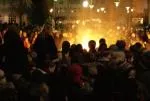
Understanding the New Wave of Social Cooperation: A Triangulation of the Arab Revolutions, European Mobilizations and the Americ
March 21st, 2012
Cambridge, MA
Hosted and organized by the Berkman Center for Internet & Society
Main website: http://cyber.harvard.edu/21M12socialcooperation/Main_Page
Goals and Key Objectives
At this event, we will undertake a historically grounded comparative approach that attempts to place these protests and their corresponding forms of social cooperation in context and seeks to establish an analytical and theoretical grounding for the study of these events. We plan not only to investigate each individual case, but also to assess the relationships (or lack thereof) between each of the respective cases.
More specifically, the workshop aims to analyze the particular details associated with each national/regional case and will endeavor to identify and discuss any commonalities between them based on a 'triangulation' of current research and understanding on the Arab revolutions, European mobilizations and the American Occupy movement. To facilitate an interactive discussion on these topics during the event, the specific angle of each of the three planned sessions was defined around clusters of participants' interest:
- EMERGING ORGANIZATIONAL FORMS AND DIGITAL TECHNOLOGIES
Which organizational forms were adopted by the movements in each case? What is the role of social media in shaping these emerging forms? Are there similarities among the cases? What do these cases tell us about the conditions and organizational principles of collective action?
- WHO MOBILIZED AND WITH WHICH GOALS AND STRATEGIES?
What is the movement composition (i.e, who were the actors and what social bases were involved)? In terms of the actors what is the continuity with previous mobilization waves, such as the global justice movement? What were/are the visions and strategies of change in each of the cases? Is there a common political view or strategy among all the cases? What are the significant divisions between actors within each individual case? Are there similar divisions across different cases, and to what extent are the local and national dynamics important in shaping movement configuration?
- EXPLANATORY FACTORS AND CONNECTIONS AMONG THE CASES
Why did social mobilization happen in so many countries at once? Are there similar explanatory factors and historical trajectories that explain why mobilization took place? Is it legitimate to talk about a global wave of mobilization? If so, how are these different cases connected and how might we confirm and document the connections between movements? What are the mechanisms of diffusion and translation among the cases?
Key links: